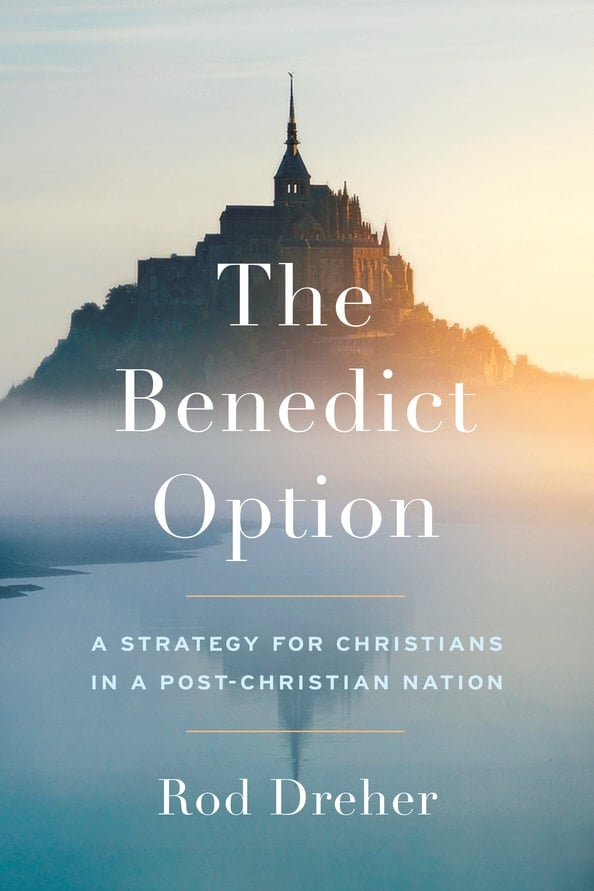In the late ‘90s, a young American conservative found himself in an awkward position. Although he had long thought of himself as a conservative Republican, he had come to value things that many conservatives did not: the environment, the poor, buying locally, a neighborhood where people knew each other, and even wearing Birkenstocks. These experiences led him to write a book in which he argued that conservatism had lost its way:
Too many people who call themselves conservative share the fundamental conviction of many liberals, namely, that individual fulfillment is the point of life. Conservative, perhaps, in their sexual views, they are, however, libertarian in their economic principles, and believe that the free market should be the guiding light of our lives together… Both mainstream liberalism and conservatism are essentially materialist ideologies.1
The book is Crunchy Cons, and the author is Rod Dreher. He sleuths his way through a variety of topics in the book, from homeschooling to the environment, but – and I can remember being surprised by this at the time – it is only at the end of the book that he addresses religion directly.
Fast forward 20 years, and religion has moved from the back to the front of Dreher’s books. In this new book, The Benedict Option, Dreher puts front and center the question of how Christians should live their faith in 21st-century America. Recently I chatted with Dreher about how this book is a fruit of his faith journey. While we spoke by phone at a distance of about 1400 miles, his passion and moral clarity resonated in his voice as though he was sitting right next to me.
That journey, Dreher explained to me, began by recognizing two things. First, the extent to which his worldview arose from his politics rather than from his faith. “I was [in the process of] allowing myself to be more formed by Catholicism than by my political commitments,” Dreher said to me over the phone. “But it was an ongoing process of conversion.
[W]e are formed more by our popular culture than by the Church, but it’s something we have to overcome. I can remember reading things that Pope Francis wrote in Laudato Si’ that really inspired me as an Orthodox Christian about how we have to regard the natural world. But this was something that set so many of my conservative friends off, and that’s a real tragedy.
As his feeling of homelessness in contemporary conservatism led him to pen Crunchy Cons, so an analogous sense of homelessness in contemporary culture inspired The Benedict Option.
The idea behinds the Benedict Option is simple: American culture is in decline. Even more, it has become toxic for Christian life. Hyper-consumerism, the popularization of the mores of the sexual revolution, progressive politics’ fixation on false notions of equality, the whittling away of religious liberty: all of the signs of the times simply do not help Christians cultivate their faith; in fact, they actively impede it. So Christians need to make spaces where they can imagine and construct their own faith-nurturing institutions and practices.
The need to retreat is as old as Christianity itself: Jesus himself did it. Indeed, as a Jesuit who makes annual 8-day retreats, I can testify to the power of occasionally fleeing the noise and confusion of modern life. But retreat is not flight, and I have wondered at times if Dreher is urging people toward such flight, to cut themselves off from and stop evangelizing the culture. When I raised that criticism, Dreher was quick to correct it: “That is the thing that drives me crazy,” he said with evident pain in his voice. “I can explain over and over again that that’s not what I’m talking about, but people hear what they want to hear. It’s an interesting question why this is so difficult for people to understand.”
Then he continued: “If we are going to be leaven for the world,if we are going to be salt and light for the world, then we have to protect our savor and we have to protect our light.” In other words, Christians should create this kind of protected space not despite, but precisely because of our Christian vocation to share the Gospel.
Of course one can disagree with many aspects of Dreher’s argument, and he is very happy for one to do so. I, for example, tend to agree with Jacques Maritain that history in all of its ups and downs is fundamentally ambiguous: Dreher’s narrative of decline is just too simplistic. But the best commentary I have seen finds the kernel of hope in the Benedict Option that should challenge everyone. At its best, the core of the Benedict Option is not an exit strategy from modernity, but a choice about how to engage it:
So what I call the Benedict Option is the choice that I believe is before all believers – Catholic, Protestant, Eastern Orthodox – whether we are going to continue to try to shore up the empire, so to speak, or whether we will make the radical choice to live in community as faithful Christians.
Dreher’s depiction of the United States as an empire that must be shored up strikingly departs from the thrust of Crunchy Cons, as Dreher now thinks we should look beyond a political renewal to a renewal of our whole culture. And that renewal will happen not through grand, large-scale structures, but within small, intentional communities. There is an intimacy and delicacy to those communities that Dreher articulates well in describing his encounter with the Benedictine Rule:
The thing that amazed me the first time I read the Rule of St. Benedict is that I expected that it would be a book of hidden knowledge, of spiritual secrets that would help me become saint. In fact, it’s really quite boring. It’s a thin little book about how to live as a monk in a monastery, when do we eat, how to say your prayers, and on and on. But there’s genius there, because Benedictine spirituality, as I later discovered, is all about the everyday, about making the everyday sacred, and about doing the ordinary routines but consecrating it all to God. And doing that faithfully, realizing that — day by day, slowly, slowly, slowly, if you’re doing it with all your heart, with a penitent heart — you will be changed. You will be refined and made more Christ-like.
I could hear a calm peace in this description of Benedictine life. In shifting his allegiance away from a political party, Dreher, I sensed, is finding the spiritual freedom to embrace greater things, even as he discovers that greatness in the little acts of daily living.

Dreher often flirts with a narrative of decline. To be sure, in The Benedict Option Dreher contributes to an ongoing conversation about the cracked foundations of contemporary American society. Many progressives will find this sort of pessimism off-putting, and perhaps uncharitable to Christians trying to engage that culture. Indeed, regular readers of Dreher’s blog will know that he does not always suffer fools lightly. But note that Dreher is here rejecting something that most on the Left find no less troubling: the jingoistic optimism of the Religious Right. When I asked Dreher about this, he responded: “The wonderful thing about Roman Catholicism is that it doesn’t track one-to-one with American political divisions, and for me that was one of the liberating things about being a Catholic.” Indeed, if nothing else, arguments like Dreher’s should hearten those who lament the dependence of so many Christians upon the GOP, and it ought to wake up those Republican Christians who still don’t see the problem. As a political scientist myself, this liberation from political parties is certainly of interest to me. When I asked him about it, it was evident that Dreher was, too:
It’s good to step outside your ideological puzzle and realize that the Gospel is much bigger than your political commitments, and sometimes being faithful to the Gospel means standing up to your political allies. I have progressive friends who do that on the issue of life, and I have conservative friends who do that on the issue of the environment or economics. But that’s liberating, frankly. When you don’t feel captive to a political party, when you realize that the Church is not the Republican or Democratic party at prayer, that opens up some really amazing possibilities for your own growth as a neighbor and as a citizen and as a Christian.
Listening to Dreher, I felt a hope that arguments like The Benedict Option could free social and religious conservatives from knee-jerk dependence upon the Republican party. As Dreher indicates, the Option ought to challenge such conservatives to be “faithful to the Gospel” in all its breadth and depth, not just the parts that fit party orthodoxy. This is advice that Dreher admits can be hard for even him to take: “We always need reformation and conversion.”
In admitting the failures of both conservative politics and the Church in evangelizing U.S. culture, Dreher to my mind exercises courage, pushing back against pride, vainglory and fear: the pride of our status in society, vainglory for more of that status, and the fear of what we could lose if we re-examined our fidelity to the Gospel.
Dreher himself has much to say about pride, telling me that he saw the pride of the Church in his investigations as a journalist into the clerical abuse scandals. He was a “very fervent and political Catholic in the 90s and early 2000s,” he related to me. “I thought the line between good and evil in the Church could be divided between liberals and conservatives.”
I had so much pride, And I thought: I’m not like those liberals who don’t respect the hierarchy: I respect the hierarchy… I was a Catholic triumphalist, but [now] I don’t have any patience for that in any church, because the brokenness of the Church at the end of late modernity is profound… It’s a temptation to think that I’m serving Christ, when all I really want to do is argue Church politics.”
The struggle to serve God rather than himself, Dreher urges, is a daily one. And so it became more clear to me that the Benedict Option alludes not only to St Benedict’s historical role in shaping European culture, but also to the concrete ways in which the saint cultivated holiness in everyday life.
More subtly, Dreher calls us to scrutinize our own commitments to pluralism and dialogue. As I noted above, Dreher describes the Benedict Option as a “radical choice” between Christ and empire. The moral richness of this “radical choice” first hit me when I asked Dreher about whether the Benedict Option meant retreating not only from the “empire” but from the task finding common ground as well. “That criticism is on point,” he said,
but I am less concerned with finding common ground than I am with being faithful. That doesn’t preclude finding common ground with others outside of my faith tradition, and I look for that. But that is not the thing that I am most concerned about.
This left me speechless. Everyone today talks about the need for finding common ground, for embracing pluralism, for resurrecting civil dialogue. What could be more important?
Simply put, for Dreher, living out one’s faith is more important. And while this doesn’t meant that Dreher is against dialogue – he’s not – he certainly is challenging the priority many give it. He led me to wonder: Am I living out my deepest commitments? Do I live out those commitments even as I interact with others of different beliefs? Ultimately, do I think that God is in charge? Dreher’s readers can give more value to pluralism than he does, as I do, and they might also assign more efficacy to grace within that pluralism, as I do, as well. But we can still be grateful for the questions Dreher raises about pluralism. He may also give us incentive to return to some of the leading theorists of Catholic engagement in pluralism, such as Jacques Maritain and John Courtney Murray, for the insights they offer our times.
Throughout our conversation, Dreher impressed me with his humility: he is not seeking to emulate St. Benedict as the grand savior of Western civilization. Benedict’s goal was a modest, if all-encompassing, one: to serve the Lord in daily life. And where the Dreher of the Crunchy Cons wanted to rescue Western civilization from itself, the Dreher of the Benedict Option has a Benedictine modesty, too:
I was really struck by how St. Benedict did not set out to save Western civilization, to shore up the empire that has fallen. All [the early Benedictines] set out to do was to establish what St. Benedict calls in his Rule a “school for the service of the Lord.” All they wanted to do is learn how we can live faithfully in community in the time and place and with the challenges we have been given. And by doing that work faithfully, seeking nothing but the face of Christ, and ordering everything else to that quest, they ended up spreading throughout Europe, evangelizing European peoples, teaching them how to do practice things like agriculture, things that had been forgotten, and preserving within those monasteries the writings of the Church fathers… Each monastery was like an ark, and, without really knowing what they were doing, they prepared Europe for the rebirth of civilization.
That an ark was Dreher’s guiding image remained with me: while an ark is needed in the fearful times of a deluge, the ark’s presence evokes the hope of safety from the flood. Just so, the Benedict Option is not about fear for Dreher, even though it does arise from fears about American society. Fundamentally, the Benedict Option is about hope: not in America, not in oneself, but in God. When I asked Dreher what he learned from the process of writing the book, he said : “I learned that we don’t have to win the victory in this lifetime, and it can’t be won in this lifetime. All we have to do is to do the very best we can where we are and let God do the rest.”
Those words reminded me of a prayer attributed to someone with whom Dreher is not often identified: Oscar Romero. Or, more particularly, the prayer to which his name is often added. The “Romero prayer” offers a similar quiet hope, reminding us that the future is in God’s hands, not ours: “We are prophets of a future not our own.”
Gone is the triumphalism of Crunchy Cons, gone is the complacency of the Morality Majority, gone is the sectarianism of the Religious Right. In their place, Dreher offers an eschatological expectation that is breath-takingly Christocentric: God will triumph, even if humans fail.
This hope is what the liberal critic of the Benedict Option should push Dreher on. For it would be easy to retreat out of fear, to withdraw out of an unwillingness to confront the obstacles to proclaiming the Gospel in our time. It would also be easy, by the way, to reject the Benedict Option out of fear: out of the fear of what it might cause us to learn about ourselves, out of a fear of learning that God is indeed bigger than us.
One cannot speak with Rod Dreher without sensing that his God is indeed very great. For all the ways I might disagree with aspects of his proposal, there is no question that, for a moment, I felt very close to him in our mutual desire for Christ. It is that desire that impels the Benedict Option forward, and with which Dreher ended our conversation:
The world still wants Christ. The question is, do we still want him and are we still willing to live sacrificially for His sake?
If you’ve read this far, then like me you would probably respond to this question with a yes. But what do we do with that yes? How are we to live “sacrificially” for Christ?
I have no firm answer to that question. But I do know that Dreher has challenged me to approach that question – to live that question – with renewed urgency. And for that, I am grateful.
***
Images courtesy of Penguin Random House.
- Crunchy Cons, 11, 13. ↩


